- Home
- Gillian Flynn
Gone Girl: A Novel Page 3
Gone Girl: A Novel Read online
Page 3
“Treasure hunt,” I said.
My wife loved games, mostly mind games, but also actual games of amusement, and for our anniversary she always set up an elaborate treasure hunt, with each clue leading to the hiding place of the next clue until I reached the end, and my present. It was what her dad always did for her mom on their anniversary, and don’t think I don’t see the gender roles here, that I don’t get the hint. But I did not grow up in Amy’s household, I grew up in mine, and the last present I remember my dad giving my mom was an iron, set on the kitchen counter, no wrapping paper.
“Should we make a wager on how pissed she’s going to get at you this year?” Go asked, smiling over the rim of her beer.
The problem with Amy’s treasure hunts: I never figured out the clues. Our first anniversary, back in New York, I went two for seven. That was my best year. The opening parley:
This place is a bit of a hole in the wall,
But we had a great kiss there one Tuesday last fall.
Ever been in a spelling bee as a kid? That snowy second after the announcement of the word as you sift your brain to see if you can spell it? It was like that, the blank panic.
“An Irish bar in a not-so-Irish place,” Amy nudged.
I bit the side of my lip, started a shrug, scanning our living room as if the answer might appear. She gave me another very long minute.
“We were lost in the rain,” she said in a voice that was pleading on the way to peeved.
I finished the shrug.
“McMann’s, Nick. Remember, when we got lost in the rain in Chinatown trying to find that dim sum place, and it was supposed to be near the statue of Confucius but it turns out there are two statues of Confucius, and we ended up at that random Irish bar all soaking wet, and we slammed a few whiskeys, and you grabbed me and kissed me, and it was—”
“Right! You should have done a clue with Confucius, I would have gotten that.”
“The statue wasn’t the point. The place was the point. The moment. I just thought it was special.” She said these last words in a childish lilt that I once found fetching.
“It was special.” I pulled her to me and kissed her. “That smooch right there was my special anniversary reenactment. Let’s go do it again at McMann’s.”
At McMann’s, the bartender, a big, bearded bear-kid, saw us come in and grinned, poured us both whiskeys, and pushed over the next clue.
When I’m down and feeling blue
There’s only one place that will do.
That one turned out to be the Alice in Wonderland statue at Central Park, which Amy had told me—she’d told me, she knew she’d told me many times—lightened her moods as a child. I do not remember any of those conversations. I’m being honest here, I just don’t. I have a dash of ADD, and I’ve always found my wife a bit dazzling, in the purest sense of the word: to lose clear vision, especially from looking at bright light. It was enough to be near her and hear her talk, it didn’t always matter what she was saying. It should have, but it didn’t.
By the time we got to the end of the day, to exchanging our actual presents—the traditional paper presents for the first year of marriage—Amy was not speaking to me.
“I love you, Amy. You know I love you,” I said, tailing her in and out of the family packs of dazed tourists parked in the middle of the sidewalk, oblivious and openmouthed. Amy was slipping through the Central Park crowds, maneuvering between laser-eyed joggers and scissor-legged skaters, kneeling parents and toddlers careering like drunks, always just ahead of me, tight-lipped, hurrying nowhere. Me trying to catch up, grab her arm. She stopped finally, gave me a face unmoved as I explained myself, one mental finger tamping down my exasperation: “Amy, I don’t get why I need to prove my love to you by remembering the exact same things you do, the exact same way you do. It doesn’t mean I don’t love our life together.”
A nearby clown blew up a balloon animal, a man bought a rose, a child licked an ice cream cone, and a genuine tradition was born, one I’d never forget: Amy always going overboard, me never, ever worthy of the effort. Happy anniversary, asshole.
“I’m guessing—five years—she’s going to get really pissed,” Go continued. “So I hope you got her a really good present.”
“On the to-do list.”
“What’s the, like, symbol, for five years? Paper?”
“Paper is first year,” I said. At the end of Year One’s unexpectedly wrenching treasure hunt, Amy presented me with a set of posh stationery, my initials embossed at the top, the paper so creamy I expected my fingers to come away moist. In return, I’d presented my wife with a bright red dime-store paper kite, picturing the park, picnics, warm summer gusts. Neither of us liked our presents; we’d each have preferred the other’s. It was a reverse O. Henry.
“Silver?” guessed Go. “Bronze? Scrimshaw? Help me out.”
“Wood,” I said. “There’s no romantic present for wood.”
At the other end of the bar, Sue neatly folded her newspaper and left it on the bartop with her empty mug and a five-dollar bill. We all exchanged silent smiles as she walked out.
“I got it,” Go said. “Go home, fuck her brains out, then smack her with your penis and scream, ‘There’s some wood for you, bitch!’ ”
We laughed. Then we both flushed pink in our cheeks in the same spot. It was the kind of raunchy, unsisterly joke that Go enjoyed tossing at me like a grenade. It was also the reason why, in high school, there were always rumors that we secretly screwed. Twincest. We were too tight: our inside jokes, our edge-of-the-party whispers. I’m pretty sure I don’t need to say this, but you are not Go, you might misconstrue, so I will: My sister and I have never screwed or even thought of screwing. We just really like each other.
Go was now pantomiming dick-slapping my wife.
No, Amy and Go were never going to be friends. They were each too territorial. Go was used to being the alpha girl in my life, Amy was used to being the alpha girl in everyone’s life. For two people who lived in the same city—the same city twice: first New York, now here—they barely knew each other. They flitted in and out of my life like well-timed stage actors, one going out the door as the other came in, and on the rare occasions when they both inhabited the same room, they seemed somewhat bemused at the situation.
Before Amy and I got serious, got engaged, got married, I would get glimpses of Go’s thoughts in a sentence here or there. It’s funny, I can’t quite get a bead on her, like who she really is. And: You just seem kind of not yourself with her. And: There’s a difference between really loving someone and loving the idea of her. And finally: The important thing is she makes you really happy.
Back when Amy made me really happy.
Amy offered her own notions of Go: She’s very … Missouri, isn’t she? And: You just have to be in the right mood for her. And: She’s a little needy about you, but then I guess she doesn’t have anyone else.
I’d hoped when we all wound up back in Missouri, the two would let it drop—agree to disagree, free to be you and me. Neither did. Go was funnier than Amy, though, so it was a mismatched battle. Amy was clever, withering, sarcastic. Amy could get me riled up, could make an excellent, barbed point, but Go always made me laugh. It is dangerous to laugh at your spouse.
“Go, I thought we agreed you’d never mention my genitalia again,” I said. “That within the bounds of our sibling relationship, I have no genitalia.”
The phone rang. Go took one more sip of her beer and answered, gave an eyeroll and a smile. “He sure is here, one moment, please!” To me, she mouthed: “Carl.”
Carl Pelley lived across the street from me and Amy. Retired three years. Divorced two years. Moved into our development right after. He’d been a traveling salesman—children’s party supplies—and I sensed that after four decades of motel living, he wasn’t quite at home being home. He showed up at the bar nearly every day with a pungent Hardee’s bag, complaining about his budget until he was offered a first drink on the hous
e. (This was another thing I learned about Carl from his days in The Bar—that he was a functioning but serious alcoholic.) He had the good grace to accept whatever we were “trying to get rid of,” and he meant it: For one full month Carl drank nothing but dusty Zimas, circa 1992, that we’d discovered in the basement. When a hangover kept Carl home, he’d find a reason to call: Your mailbox looks awfully full today, Nicky, maybe a package came. Or: It’s supposed to rain, you might want to close your windows. The reasons were bogus. Carl just needed to hear the clink of glasses, the glug of a drink being poured.
I picked up the phone, shaking a tumbler of ice near the receiver so Carl could imagine his gin.
“Hey, Nicky,” Carl’s watery voice came over. “Sorry to bother you. I just thought you should know … your door is wide open, and that cat of yours is outside. It isn’t supposed to be, right?”
I gave a noncommittal grunt.
“I’d go over and check, but I’m a little under the weather,” Carl said heavily.
“Don’t worry,” I said. “It’s time for me to go home anyway.”
It was a fifteen-minute drive, straight north along River Road. Driving into our development occasionally makes me shiver, the sheer number of gaping dark houses—homes that have never known inhabitants, or homes that have known owners and seen them ejected, the house standing triumphantly voided, humanless.
When Amy and I moved in, our only neighbors descended on us: one middle-aged single mom of three, bearing a casserole; a young father of triplets with a six-pack of beer (his wife left at home with the triplets); an older Christian couple who lived a few houses down; and of course, Carl from across the street. We sat out on our back deck and watched the river, and they all talked ruefully about ARMs, and zero percent interest, and zero money down, and then they all remarked how Amy and I were the only ones with river access, the only ones without children. “Just the two of you? In this whole big house?” the single mom asked, doling out a scrambled-egg something.
“Just the two of us,” I confirmed with a smile, and nodded in appreciation as I took a mouthful of wobbly egg.
“Seems lonely.”
On that she was right.
Four months later, the whole big house lady lost her mortgage battle and disappeared in the night with her three kids. Her house has remained empty. The living-room window still has a child’s picture of a butterfly taped to it, the bright Magic Marker sun-faded to brown. One evening not long ago, I drove past and saw a man, bearded, bedraggled, staring out from behind the picture, floating in the dark like some sad aquarium fish. He saw me see him and flickered back into the depths of the house. The next day I left a brown paper bag full of sandwiches on the front step; it sat in the sun untouched for a week, decaying wetly, until I picked it back up and threw it out.
Quiet. The complex was always disturbingly quiet. As I neared our home, conscious of the noise of the car engine, I could see the cat was definitely on the steps. Still on the steps, twenty minutes after Carl’s call. This was strange. Amy loved the cat, the cat was declawed, the cat was never let outside, never ever, because the cat, Bleecker, was sweet but extremely stupid, and despite the LoJack tracking device pelleted somewhere in his fat furry rolls, Amy knew she’d never see the cat again if he ever got out. The cat would waddle straight into the Mississippi River—deedle-de-dum—and float all the way to the Gulf of Mexico into the maw of a hungry bull shark.
But it turned out the cat wasn’t even smart enough to get past the steps. Bleecker was perched on the edge of the porch, a pudgy but proud sentinel—Private Tryhard. As I pulled in to the drive, Carl came out and stood on his own front steps, and I could feel the cat and the old man both watching me as I got out of the car and walked toward the house, the red peonies along the border looking fat and juicy, asking to be devoured.
I was about to go into blocking position to get the cat when I saw that the front door was open. Carl had said as much, but seeing it was different. This wasn’t taking-out-the-trash-back-in-a-minute open. This was wide-gaping-ominous open.
Carl hovered across the way, waiting for my response, and like some awful piece of performance art, I felt myself enacting Concerned Husband. I stood on the middle step and frowned, then took the stairs quickly, two at a time, calling out my wife’s name.
Silence.
“Amy, you home?”
I ran straight upstairs. No Amy. The ironing board was set up, the iron still on, a dress waiting to be pressed.
“Amy!”
As I ran back downstairs, I could see Carl still framed in the open doorway, hands on hips, watching. I swerved into the living room, and pulled up short. The carpet glinted with shards of glass, the coffee table shattered. End tables were on their sides, books slid across the floor like a card trick. Even the heavy antique ottoman was belly-up, its four tiny feet in the air like something dead. In the middle of the mess was a pair of good sharp scissors.
“Amy!”
I began running, bellowing her name. Through the kitchen, where a teakettle was burning, down to the basement, where the guest room stood empty, and then out the back door. I pounded across our yard onto the slender boat deck leading out over the river. I peeked over the side to see if she was in our rowboat, where I had found her one day, tethered to the dock, rocking in the water, her face to the sun, eyes closed, and as I’d peered down into the dazzling reflections of the river, at her beautiful, still face, she’d suddenly opened her blue eyes and said nothing to me, and I’d said nothing back and gone into the house alone.
“Amy!”
She wasn’t on the water, she wasn’t in the house. Amy was not there.
Amy was gone.
AMY ELLIOTT
SEPTEMBER 18, 2005
DIARY ENTRY
Well, well, well. Guess who’s back? Nick Dunne, Brooklyn party boy, sugar-cloud kisser, disappearing act. Eight months, two weeks, couple of days, no word, and then he resurfaces, like it was all part of the plan. Turns out, he’d lost my phone number. His cell was out of juice, so he’d written it on a stickie. Then he’d tucked the stickie into his jeans pocket and put the jeans in the washer, and it turned the stickie into a piece of cyclone-shaped pulp. He tried to unravel it but could only see a 3 and an 8. (He said.)
And then work clobbered him and suddenly it was March and too embarrassingly late to try to find me. (He said.)
Of course I was angry. I had been angry. But now I’m not. Let me set the scene. (She said.) Today. Gusty September winds. I’m walking along Seventh Avenue, making a lunchtime contemplation of the sidewalk bodega bins—endless plastic containers of cantaloupe and honeydew and melon perched on ice like the day’s catch—and I could feel a man barnacling himself to my side as I sailed along, and I corner-eyed the intruder and realized who it was. It was him. The boy in “I met a boy!”
I didn’t break my stride, just turned to him and said:
a) “Do I know you?” (manipulative, challenging)
b) “Oh, wow, I’m so happy to see you!” (eager, doormatlike)
c) “Go fuck yourself.” (aggressive, bitter)
d) “Well, you certainly take your time about it, don’t you, Nick?” (light, playful, laid-back)
Answer: D
And now we’re together. Together, together. It was that easy. It’s interesting, the timing. Propitious, if you will. (And I will.) Just last night was my parents’ book party. Amazing Amy and the Big Day. Yup, Rand and Marybeth couldn’t resist. They’ve given their daughter’s namesake what they can’t give their daughter: a husband! Yes, for book twenty, Amazing Amy is getting married! Wheeeeeee. No one cares. No one wanted Amazing Amy to grow up, least of all me. Leave her in kneesocks and hair ribbons and let me grow up, unencumbered by my literary alter ego, my paper-bound better half, the me I was supposed to be.
But Amy is the Elliott bread and butter, and she’s served us well, so I suppose I can’t begrudge her a perfect match. She’s marrying good old Able Andy, of course. They’ll be
just like my parents: happy-happy.
Still, it was unsettling, the incredibly small order the publisher put in. A new Amazing Amy used to get a first print of a hundred thousand copies back in the ’80s. Now ten thousand. The book-launch party was, accordingly, unfabulous. Off-tone. How do you throw a party for a fictional character who started life as a precocious moppet of six and is now a thirty-year-old bride-to-be who still speaks like a child? (“Sheesh,” thought Amy, “my dear fiancé sure is a grouch-monster when he doesn’t get his way …” That is an actual quote. The whole book made me want to punch Amy right in her stupid, spotless vagina.) The book is a nostalgia item, intended to be purchased by women who grew up with Amazing Amy, but I’m not sure who will actually want to read it. I read it, of course. I gave the book my blessing—multiple times. Rand and Marybeth feared that I might take Amy’s marriage as some jab at my perpetually single state. (“I, for one, don’t think women should marry before thirty-five,” said my mom, who married my dad at twenty-three.)
My parents have always worried that I’d take Amy too personally—they always tell me not to read too much into her. And yet I can’t fail to notice that whenever I screw something up, Amy does it right: When I finally quit violin at age twelve, Amy was revealed as a prodigy in the next book. (“Sheesh, violin can be hard work, but hard work is the only way to get better!”) When I blew off the junior tennis championship at age sixteen to do a beach weekend with friends, Amy recommitted to the game. (“Sheesh, I know it’s fun to spend time with friends, but I’d be letting myself and everyone else down if I didn’t show up for the tournament.”) This used to drive me mad, but after I went off to Harvard (and Amy correctly chose my parents’ alma mater), I decided it was all too ridiculous to think about. That my parents, two child psychologists, chose this particular public form of passive-aggressiveness toward their child was not just fucked up but also stupid and weird and kind of hilarious. So be it.

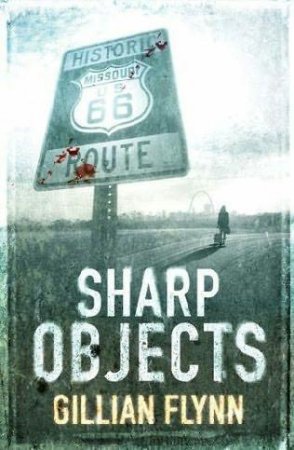 Sharp Objects
Sharp Objects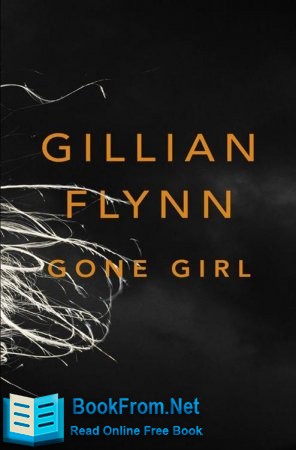 Gone Girl
Gone Girl Dark Places
Dark Places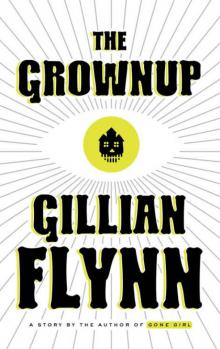 The Grownup
The Grownup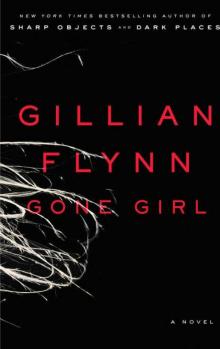 Gone Girl: A Novel
Gone Girl: A Novel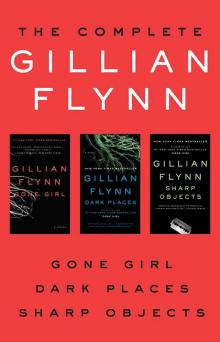 The Complete Gillian Flynn
The Complete Gillian Flynn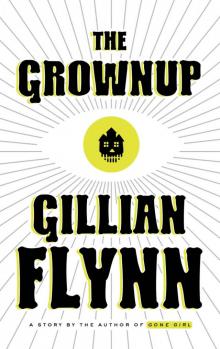 The Grownup: A Story by the Author of Gone Girl (Kindle Single)
The Grownup: A Story by the Author of Gone Girl (Kindle Single)